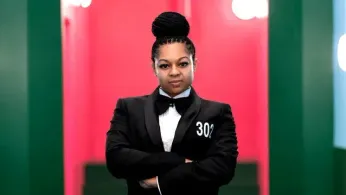
4 hours ago
How Squid Game: The Challenge’s Dajah Turned a Reality Show Finale into a Rallying Cry for Queer Resilience
READ TIME: 3 MIN.
Netflix’s “Squid Game: The Challenge” was designed to be ruthless: 456 hopefuls, one $4. 56 million prize, and no shortage of drama, alliances, and betrayals. But for many queer viewers, the real win wasn’t the cash—it was watching Dajah Graham, a proud lesbian from Atlanta, make it to the finale with her authenticity intact, her voice unwavering, and her message unmistakably queer .
Dajah’s journey wasn’t just about outsmarting the competition or braving the show’s notorious challenges. It was about taking up space as a Black lesbian on one of the world’s most-watched reality competitions, smashing stereotypes and sidestepping the tropes that so often box in queer contestants. “Don’t let anyone dismiss you, ” she declared in her finale interview—a sentiment that landed not just as a personal mantra, but as a rallying cry for every LGBTQ+ person who’s been underestimated or sidelined .
Squid Game: The Challenge isn’t known for its subtlety: the show’s format is a pressure cooker, pitting strangers against one another for a life-changing sum. Yet, for queer audiences, the real tension is often about representation—whether LGBTQ+ contestants will be given narrative depth, allowed to be more than a token, or forced to edit themselves for mainstream comfort.
Dajah didn’t just represent; she redefined. She spoke candidly about her sexuality, her family’s journey towards acceptance, and the way her queerness shaped her approach to the competition. “I’m unapologetically myself, and I want people to know that’s enough, ” Dajah shared, offering a kind of visibility that feels especially urgent at a time when anti-LGBTQ+ rhetoric is resurging in popular discourse .
Her authenticity wasn’t just for show. Throughout the series, Dajah became a confidant for fellow players, building alliances not through manipulation, but through empathy and openness. For queer viewers, seeing someone win trust and respect on her own terms—while never shrinking her identity—felt quietly revolutionary.
Reality TV loves an underdog, but it rarely spotlights the unique challenges LGBTQ+ contestants face—especially queer women of color. Dajah’s run to the final three wasn’t just a feat of gameplay, but a masterclass in resilience under the gaze of both competitors and millions of viewers worldwide.
Her parting words—“Don’t let anyone dismiss you”—echoed across social media, quickly becoming a rallying hashtag for fans and queer advocates alike . For many, Dajah’s journey was less about winning the prize and more about proving that queer excellence is not an exception, but a rule that’s been waiting for its spotlight.
Dajah’s willingness to talk about her family’s evolving support—moving from discomfort to pride—was a powerful reminder of both the progress and the lingering challenges facing queer youth and families. In a media landscape where coming out stories too often end at the closet door, her narrative offered a rare glimpse into the after—what it means to live out and proud in every arena, even one as cutthroat as “Squid Game: The Challenge” .
Beyond the on-screen drama, Dajah’s story is a testament to the power of chosen family—both in the alliances she built in the game and the community she’s inspired outside it. The outpouring of queer support on social media, from memes to heartfelt DMs, speaks to a hunger for representation that goes deeper than visibility: it’s about seeing ourselves as strategists, leaders, and, yes, finalists.
In the wake of her finale, Dajah has become more than just a reality TV contestant—she’s a symbol of queer tenacity, the kind that flourishes even under the harshest spotlights. As more LGBTQ+ athletes, artists, and everyday heroes take center stage, Dajah’s words serve as both comfort and challenge: “Don’t let anyone dismiss you. ”
It’s a message that feels especially urgent as queer rights face renewed legislative and cultural attacks. In a media moment where trans and queer visibility is often met with backlash, Dajah’s presence in the Squid Game arena is a reminder that representation is not just about being seen, but about being heard—and, ultimately, about winning on our own terms .
For queer viewers, Dajah’s journey is a blueprint for survival and self-love, a vivid reminder that the most powerful win is showing up as yourself—even when the world is watching. Whether you’re navigating the chaos of reality TV or just surviving another Monday, her story is proof that queer resilience belongs in every arena.
And as Dajah herself might say, don’t just play the game. Change the rules, claim your space, and never, ever let anyone dismiss you.






